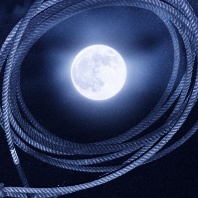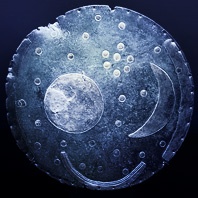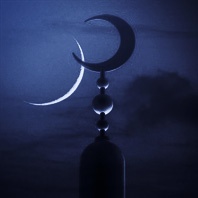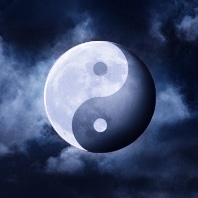Rubrik: Worth seeing
In 2020 the full moon will fall on a 31st October and a Halloween party can take place in the full moon light. The imagination of people fits this well apparently, because no matter where you look, the full moon can be seen in all portrayals of Halloween. In historical terms, there is no connection, however. Halloween is the evening before All Saints’ Day (originally: »All Hallows’ Eve«). The basic idea of this festival is the remembrance of saints and it is connected to the wish to drive out bad spirits. This is how the gruesome costumes came into play.
Read more
There are movies that live on Mount Olympus. The movie “It’s a wonderful life” by Frank Capra from 1946, belongs to them. However, at the time of the release, shortly before Christmas of the aforementioned year, this had not been the case yet. Commercially, this movie was a flop and did not turn into a cult movie until decades later. Today, the story about George Bailey (played by James Stewart), who does many good deeds in a small American town, quarrels with his destiny on Christmas Eve and eventually, through meeting an unconventional angel, learns to recognise the value of life, is considered to be one of the best movies in motion picture history.
Read more
When natural forces are involved, people are mostly torn between fear and fascination. They are looking for the challenge to come into contact with these forces. At the same time, everyone has to respectfully recognize these elemental forces, sooner or later. This becomes impressively apparent in surfing, when a person is gliding on a metre high wave on a surf board. If he manages to stay in front of the crest, and not to be rolled over by the breaking of the wave, he is the winner and in the belief to control the element. If he is not able to do so, it mostly turns dangerous or at least uncomfortable. It is a risky game.
Read more
This disk, made of bronze and gold, with an age of around 3,600 years, belongs to the oldest find representing astronomical phenomena and thereby depicting planets and stars in the sky. It is thus of great value, because it is evidenced that people of the Bronze Age (2200-800 BC) did not only possess manual skills to create such a refined metal disk, but above all, had the knowledge about astronomical processes. They observed the celestial events with the naked eye and portrayed this in an artistic form.
Read more
In China, the September full moon is a special day. It is the day of the Moon Festival or Mid-Autumn Festival. This festival is traditionally celebrated on the 15th day of the eighth month of the old Chinese calendar. Because the moon month averages 29.5 days in length, the 15th day is usually a full moon day, however, there are slight shifts in some years. The Moon Festival is one of the most important festivals in China, but is also held in Korea and Vietnam as well as in the respective districts in big cities around the globe.
Read more
 We are approaching a more sinister subject, the werewolf, a being that apparently changes from human into a wolf on the full moon. Everyone has heard about it or seen more or less plausible interpretations in movies. Where does this belief stem from? Why a wolf of all animals? And why in the full moon light?
We are approaching a more sinister subject, the werewolf, a being that apparently changes from human into a wolf on the full moon. Everyone has heard about it or seen more or less plausible interpretations in movies. Where does this belief stem from? Why a wolf of all animals? And why in the full moon light?
The word »werewolf« contains, without difficulty to recognise, the »wolf« and the word »were« that translates into »man, human« and can be found in many languages, et al. Old Enlish, Germanic, Old High German and more. So we are talking about a man wolf or a wolfman, someone who can or must take the shape of a wolf. This belief has been widespread in the old days and this had nothing to do with the cliché we are getting to see in horror movies today.
Read more
As a general rule, we live our secular life by a so-called solar calendar, the Gregorian calendar, which determines our calculation of time since the end of the 16th century. The biggest advantage of a solar calendar is its connection to the seasons: it is warm in summer, cold in winter, at least this is how it should be … at times however, as we all know, the weather goes crazy and sunshine is long-awaited in summer and snow stays away in winter. The seasons are connected to the (solar) calendar months.
Read more
Although, one could easily presume that full moon influences the reproduction of many creatures, this has really only been proven for some species. One assumes this is the case with wolves, specific insects or crabs and also many humans vow not being able to do anything other than to look for the closeness of the other (or the same) sex at full moon. But absolutely certain are scientist only about one animal species that may not even be considered an animal by many: the corals. Here it has been established that reproduction is dependent on water temperature and moon light.
Read more
In view of the two original principles »feminine« and »masculine«, it is tempting to attribute the feminine, receiving principle to the moon and the masculine, creative principle to the sun. And most languages, where nouns posess articles, do reflect this, like for example the Romance languages (French, Spanish, Portuguese, Italian). However, there are a number of languages, for example German, Norwegian, Polish, Slovenian, Serbian or Czech, where the moon is masculine.
So, does the moon contain more masculine quality, after all, than originally assumed?
Read more
On Wednesday, 15th June 2011 (or Thursday 16th June for certain time zones) is full moon and a total lunar eclipse at the same time. However, it will only be completely visible in the Near and Middle East. In Asia and Australia, the moon will be already set and in Europe and Africa, the moon will be just rising by the time the lunar eclipse takes place. In America, this event won’t be visible at all.
Read more





 We are approaching a more sinister subject, the werewolf, a being that apparently changes from human into a wolf on the full moon. Everyone has heard about it or seen more or less plausible interpretations in movies. Where does this belief stem from? Why a wolf of all animals? And why in the full moon light?
We are approaching a more sinister subject, the werewolf, a being that apparently changes from human into a wolf on the full moon. Everyone has heard about it or seen more or less plausible interpretations in movies. Where does this belief stem from? Why a wolf of all animals? And why in the full moon light?



